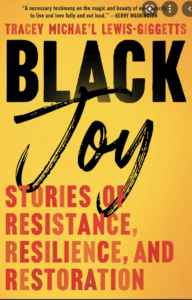 When Barack Obama was elected, I fervently hoped we would begin to heal our nation’s racial divide…
When Barack Obama was elected, I fervently hoped we would begin to heal our nation’s racial divide…
The exact opposite happened.
And not because of any flaws in the American character, but because those who control our institutions find it useful for their own ends to maintain this divide.
The latest such example is the Kansas City Star’s celebration of “Black Joy.”
I think this term comes from a new book by that name, published to coincide with February’s Black History Month. The book and the term can best be described as a celebration of the African American experience.
Specifically, it tells how black Americans have created a vibrant culture that is both parallel to and contained within the broader American society. This culture has served the black community well, and has helped it persevere in the face of staggering odds. I thought of the black family in The Sound and the Fury, of whom author William Faulkner said, “They Endured.”
I especially enjoyed the author’s celebration of the support system offered by an extended circle of family and friends that characterize so much of the black experience.
If this were the substance of Tracey Michae’l Lewis-Giggets’ book of that name, I would heartily endorse it, and the Star’s promotion of its message.
Unfortunately, the sad fact is the book, which starts with great promise (Mrs. Lewis-Giggets is a gifted and winning writer) soon devolves into the dead end of identity politics.
What do I mean by that?
Professor Catherine R. Stimpson defines identity politics as a “group’s assertion that it is a meaningful group; that it differs significantly from other groups; that its members share a history of injustice and grievance and that its psychological and political mission is to explore, act on and act up its group identity.”
“Black Joy” fits this to a tee.  Its tone is a schizophrenic one.
Its tone is a schizophrenic one.
It alternates between joyous affirmation of the author’s own life as a strong black woman and a bitter, seething hatred of the larger American experience, especially of white men, all white men.
A rather different perspective is by the conservative critic Charles Murray, who says that identity politics is a form of cultural Marxism, where the oppressor/oppressed matrix is not just capitalists v. workers but white men (all white men) versus people of color, gays, trans-gendered, etc. (Within that mix the hierarchy of victimhood is always shifting, depending on the electoral calculus of the Democratic Party at a given moment.)
Murray describes it bluntly as “13% of the population (blacks) telling whites, 60% of the population, that they are racists, bad people, the cause of black’s problems, and that they (whites) had better change their way or else…. Many middle-class and working-class whites have not been insulted into agreement.”
This is where we are as a society, a country that is more polarized than ever along racial lines. The oligarchy of Jeff Bezos, Warren Buffet, Bill Gates and Mark Zuckerberg want it this way because it makes whites feel guilty and blacks angry, which insures turnout for the Democratic Party.
Data Points:
In each of the foregoing cases, we see the ruling class pulling the ladder up after them, undermining upward mobility based on merit and replacing it with ideology by eliminating objective standards.
It is this “racial reckoning” mentality based on a perception of American as a fundamentally racist society, that underlies“Black Joy.”
It’s really a shame because the author does for growing up as black bourgeoise in the 70’s and 80’s what Philip Roth did for growing up Jewish in the 50’s and 60’s.
 However, as Snoop Dog (of all people!) said about the movie “Twelve Years a Slave,” why do we need to only keep hearing about black people being brutalized and oppressed in the past?
However, as Snoop Dog (of all people!) said about the movie “Twelve Years a Slave,” why do we need to only keep hearing about black people being brutalized and oppressed in the past?
Why can’t we also hear about the success and achievements of the present generation of African Americans, as well as those past generations whose accomplishments were even more impressive given the obstacles they faced?
I was at one of my favorite restaurants recently. A black woman my age was saying at the next table to a young couple in their 30s that she was turning 70 this year. I thought of what her prospects as a black child born in 1952 had been.
Maybe the author of Black Joy, Tracey Michae’l Lewis-Giggetts, born in 1974, needs to speak to someone of my generation to see how far we have come in the last 70 years. A little perspective is always in order. After all, its hard to believe in a systemic racism when all the most powerful institutions in American society have affirmed and reaffirmed this commitment to racial justice, at least as that term is used in this book.
Moreover, when you are invested as Ms. Lewis-Giggetts in a version of history that views this country as irretrievably evil and corrupt, just like the capitalist system that sustains it; chances are you will not gain an audience that doesn’t already agree with you.
It’s a shame because she has a lot to say.
We desperately need to start a discussion across the chasms that divide us, but the kind of adherence to identity politics that permeates this book precludes it. What a sad waste of a formidable talent!










Morgan Freeman said and I agree with him, “I am going to stop calling you a white man and I’m going to ask you to stop calling me a black man. Black history is American history.”
Ms. Lewis-Giggetts needs to accept the truth, facts and what is real before she can speak about what is true.
A child born today in this country right off the bat has a good a chance of making something of them selves as the next child does. It’s up to those first few years of a childs development that will more than likely determine what path the child will follow no matter what race they belong to.
Wow, Super Dave starts the ball rolling with a clear-headed, succinct comment!
Bravo…
Take that comments section trolls!